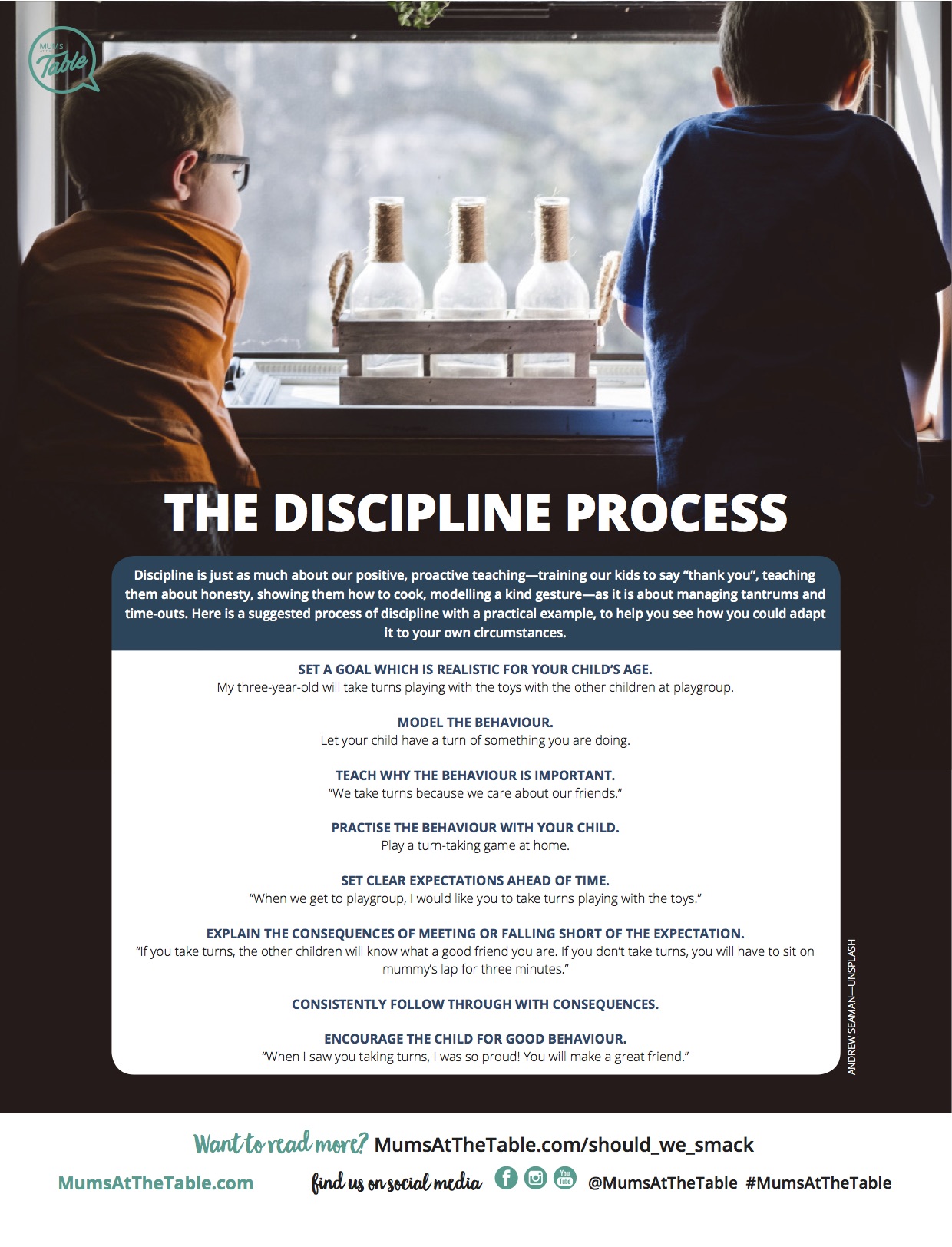Physical punishments to correct our children’s behaviour can sometimes be seen as child abuse. You’d be surprised why there’s still a case for smacking.
My husband and I have been married for 11 years. During those years, there is one issue that has sparked more arguments than any other: the disciplining of our children. Growing up, my husband and I come from very different family backgrounds with completely opposite approaches to discipline. And naturally, each of us tends to assume the way we were raised was right—or at least normal.
My husband’s parents were quite strict and expected him and his sisters to obey them simply “because I said so”, with little room for questions or explanations. If they did not obey straight away, they could expect to be given a smack. There were rules about most aspects of daily life and the rules were fairly inflexible.
My parents were the opposite. I don’t remember having any rules at all and punishment was extremely rare—I remember being smacked only twice in my whole life! Once was when I was about to cross a busy road without looking. And let’s just say the other one involved a skipping rope handle and a brand new piano. Usually, my parents simply explained why we should not do something and that must have been enough for me and my sister.
Since having our own children, there have been many occasions when my husband and I have disagreed about discipline. Generally, my husband thinks we need to be tougher and I think we need to be more understanding. It has been really important for us to make time to discuss the issue at hand (in private), seeking to understand the other person’s perspective and find a middle road.
Read on to find out whether it’s even legal to spank or smack your child, and the best way to manage their behaviour—yes, even when they throw tantrums. We also have a very handy step-by-step process you can download to help you with disciplining your child and better manage parent-child relationships.
What the law says about smacking children

Before we go on, let’s talk definitions. The word smack has very different meanings for people. In the context of this article, smacking or spanking a child means hitting them with an open hand, usually on the buttocks.
Smacking children and Australia law
According to the Australian Institute of Family Studies, smacking falls under the umbrella of corporal punishment. It’s the use of physical force to correct a child’s behaviour.
In Australia, corporal punishment by a parent or carer is lawful provided it is reasonable. ctually defining the forms of physical punishment of children and what is reasonable, however, can be problematic as it can be difficult to draw a line. Does smacking (as defined above) fall into the same form of physical violence such as kicking, belting, shaking or biting?
New South Wales is the only Australian state that has made an attempt at outlining what constitutes “unreasonable”: Force applied to any part of the head or neck of a child or to any other part of the body that results in bruising, marking or other injury lasting longer than a “short period” is unreasonable.
Smacking children and New Zealand law
Unlike Australia, New Zealand amended section 59 of the Crimes Act in 2007, which meant using “reasonable force” to discipline a child is illegal in the country.
The aim of the amendment was not, as some claimed, to make raising children all the more difficult for parents. Instead, it was to remove the “reasonable force” defence when parents and caregivers are being prosecuted for assault on children—and you’d expect them to be facing court due to savage beatings, not a light smack on the bottom.
Discipline and behaviour management of young children
The thing that has helped me and my husband to find common ground on this issue of smacking (and many others) has been going back to God’s Word, the Bible. It has helped us to lay down some solid foundations for a unified approach. So what does the Bible say?
We often use the word discipline to mean punishing a child for doing the wrong thing. But the Bible’s definition is much broader. In the Bible, the word discipline means something more like discipling (making disciples).
As Christians, we are inviting our children to follow us as we follow Jesus. In other words, the Bible sees childhood as a kind of apprenticeship in their parents’ character and values; discipline refers to a whole range of “tools” parents can use in this process.
On the proactive side, discipline involves:
- Modelling
- Teaching
- Encouraging
- Training
- Setting clear expectations
On the reactive side, it involves:
- Praising
- Correcting
- Rebuking
- Letting children experience the consequences of their actions
According to the Bible, there is only one perfect parent: God. To find out what it means to discipline our children, we first need to look at His example. When we put our trust in Jesus, God adopts us as His spiritual children. As our heavenly Father, God wants us to grow up to share His character and values.
The Bible encourages us to “endure hardship as discipline; God is treating you as his children”. Later we read, “We have all had human fathers who disciplined us and we respected them for it. How much more should we submit to the Father of spirits and live! They disciplined us for a little while as they thought best; but God disciplines us for our good, in order that we may share in his holiness”.
Our human discipline is imperfect: we have limited wisdom, limited patience and a limited timeframe. But God’s discipline of His spiritual children is perfect. In His infinite wisdom, God allows us to experience hard things so that we will mature into people who share His character and values.
As we discipline our children, we are also being disciplined by our loving heavenly Father. The Bible is clear that the heart of discipline—both God’s and ours—is love for our children. In Proverbs we read, “My son, do not despise the Lord’s discipline, and do not resent his rebuke, because the Lord disciplines those he loves, as a father the son he delights in”.
Our discipline should be a sign, not of anger or frustration, but of our love and commitment to our children.
Because we love our children, we care deeply about what kind of people they are becoming. According to the Bible, parents are responsible for helping their children grow towards physical and moral maturity. We need to pass on to our children the skills and values that will enable them to live a full and meaningful life.
When smacking children is acceptable
As we saw earlier, discipline is not the same thing as punishment. While punishment looks back to a wrong committed, discipline looks forward to the goal. As Christian parents, our ultimate goal is to teach our children to follow Jesus; we want them to become children of God and reflect His values in the world.
Once our children are adults, they will be responsible for their own moral decisions. So the goal of childhood discipline is also self-discipline: we are equipping our children with the skills to make good choices for life.
The book of Proverbs talks about the “rod” as a means of parental discipline: “Whoever spares the rod hates their children, but the one who loves their children is careful to discipline them”. Some Christians believe that this verse requires Christian parents to discipline their children in a physical way.
Others interpret the “rod” in Proverbs as a symbol of disciplinary punishment as a whole, and so choose to use different kinds of negative consequences for their children, such as time-outs, allowing natural consequences, withdrawing privileges or giving extra chores. This approach follows the advice of parenting experts who discourage physical discipline, because they see it as unnecessary, ineffective, open to abuse and harmful for a child’s mental health.
At the very least, the use of the “rod” in Proverbs certainly implies that smacking can be one element of loving discipline, alongside all of the others mentioned above.
Like any form of discipline, it needs to be done calmly and consistently; it needs to be done out of love, not anger.
On this issue, I believe it is vital for Christian parents to encourage each other in our shared goals for discipline—to lovingly guide, teach and disciple our children—even if we disagree on the specific details of how to get there.
All parents are human—we will inevitably get discipline wrong sometimes. All human parents are prone to get impatient or inconsistent in our discipline. We can get lazy and focus on the negative, reactive aspects of discipline, while neglecting the positive, proactive things we can do to encourage our children’s discipleship. The Bible actually warns against this tendency, saying, “Fathers, do not exasperate your children; instead, bring them up in the training and instruction of the Lord”.
Our children are human too—and so, good discipline does not guarantee our children will grow up to share our character and values as adults.
In spite of these realities, God has entrusted our children into our care. As their parents, we are responsible for helping them move towards maturity as disciples of Jesus and children of God. With God as our model of loving, goal-oriented discipline, we ought to love our children enough to teach, train, encourage, correct—and sometimes punish them—for the sake of their long-term growth.
And no matter what happens, we and our children can always run into the arms of our perfect heavenly Father. There we find God’s forgiveness and strength to live as His children in the world.
FREE PRINTABLE!

How helpful was this article?
Click on a star to rate it!
4.4 / 5. 7
Be the first to rate this post!
Harriet Connor
Related posts
Subscribe
Receive personalised articles from experts and wellness inspiration weekly!


